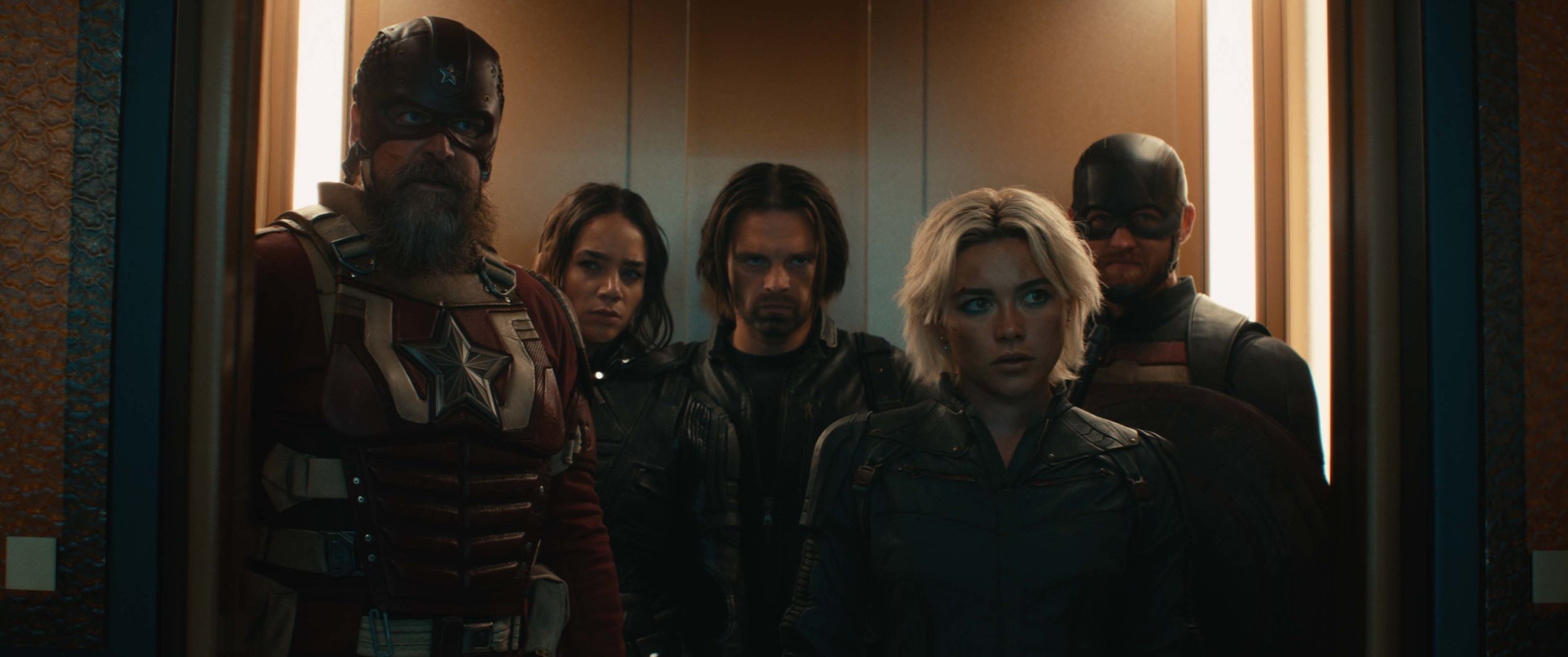REVIEW: 'Thunderbolts*' gives Marvel movies a reason to keep going
David Harbour, Hannah John-Kamen, Sebastian Stan, Florence Pugh, and Wyatt Russell in Thunderbolts*, directed by Jake Schreier.
Until I began writing this review, I fancied myself a lapsed Marvel movie viewer. Somehow, it felt like I hadn’t been plugged into the franchise since Guardians of the Galaxy Vol. 3 came out in 2023. But when I checked my film diary, it turned out the only feature I’ve missed is the recent Captain America: Brave New World. Maybe it was the glut of Disney+ shows that made me feel that way; with dozens of hours of stories playing out on streaming (most of which I’ve skipped in favour of better series), the movies and characters within them felt less interconnected and not worth caring about.
So consider me surprised that Thunderbolts*, the new B-team movie featuring some of the scruffier characters in the Marvel roster, actually felt worthwhile. The marketing did the movie no favours; with no obvious story arc or villain present, the pitch was seemingly to see the movie for the familiar faces: Florence Pugh and David Harbour return from Black Widow, Hannah John-Kamen from Ant-Man and the Wasp, Sebastian Stan from Captain America: The Winter Soldier, and Wyatt Russell from the Falcon streaming show.
Julia Louis-Dreyfus as Valentina Allegra de Fontaine, the shadowy U.S. government operative.
But the trailers weren’t wrong; this team is the core attraction of the movie. Each character’s baggage and past crimes weighs heavily on them, and the screenplay simply adds a villain who personifies those dark feelings. In dramatic terms, it’s not subtle (there’s literally a scene of a character repeatedly punching their dark self), but at least it’s a Marvel movie that chooses to be about something.
Thunderbolts* re-introduces us to Yelena Bulova (Pugh), a former assassin like Scarlett Johannson’s Natasha Romanoff/Black Widow, who was raised as a child alongside Romanoff by Alexei Shostakov/Red Guardian (Harbour). Yelena has been coerced into cleaning up after the mistakes of a shadowy government organization run by Valentina Allegra de Fontaine (Julia Louis Dreyfus). When De Fontaine is targeted for an impeachment hearing, Yelena becomes expendable, alongside a number of De Fontaine’s other agents. Together, they decide to grudgingly team up to stop De Fontaine and figure out what secret she is trying to hide from the world.
Anyone who remembers the first Guardians of the Galaxy movie will recognize some of the narrative techniques here: establish the grimy backstory of the roguish heroes, force them to become allies, and transform them into an ersatz family by the end. However, in contrast to the rainbow-coloured, cosmic goofiness of the Guardians movies, Thunderbolts* is decidedly more grim and dour. All of these lead characters have lots of blood on their hands, and they’re pretty depressed about it. The visuals reflect that; the cinematography here is the most desaturated of anything in the franchise to date (except for maybe that fight scene in Thor: Love and Thunder) and that’s saying something in a film series that isn’t known for imitating the bold styling of its source material.
Red Guardian, Ghost, John Walker, and Yelena don’t really want to be a team at first.
Nevertheless, when the characters do end up confronting their demons (seemingly thanks to the power of a group hug, no less!), it’s accomplished via an engaging hall-of-mirrors sequence that carries Yelena through her traumatic memories. This is the part that maybe best adapts the comic book medium, and it shows that not every Marvel movie needs to end in an over-choreographed fight scene with cataclysmic proportions. And it comes after one of the more maturely scripted dialogue scenes I can remember in the series, where Yelena and Alexei hash out their broken father/daughter relationship. Yelena voices the overwhelming feelings of loneliness and lack of motivation she’s been dealing with, and it seems deliberately aimed at young members of the audience who might share those sentiments.
Does Thunderbolts* signify a change at Marvel HQ? An acknowledgement that they have been on autopilot for the past few years? It’s hard to say. Looking to the future, the upcoming retrofuturist Fantastic Four reboot suggests that the studio still has some interest in experimentation. Marvel’s strength has always been in their characters, and recent projects show that when they favour plot (and the quantity of projects), it costs them. Time will tell if they can find the balance again.
Thunderbolts* gets three stars out of four.
Stray thoughts
What did all the civilians who get briefly banished to the shadow world experience? Are they irrevocably traumatized? Being a background character in the Marvel Cinematic Universe is a rough ride.
The shadows evoked what happened to some of the victims of the 1945 nuclear bombings in Japan - creepy stuff.




